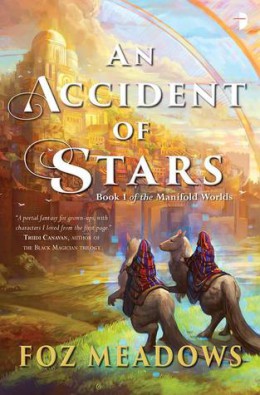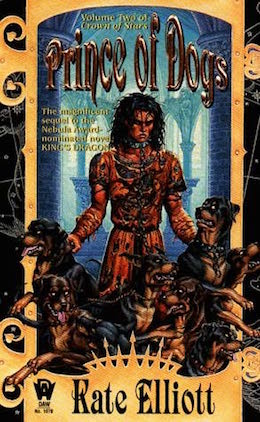I first encountered Kate Elliott’s work in high school: I remember seeing her Jaran books in stores, but it was the first volume of her Crown of Stars sequence, King’s Dragon, that ultimately provided my introduction. It’s a series that opened my eyes to a lot of different ideas, both SFFnal and political, and while I didn’t always have the language at the time to describe why the books were so important and compelling to me, there were nonetheless moments where they socked me right in the heart.
One of these moments—the definitive such moment, in many ways—happens at the end of the prologue to book two, Prince of Dogs. It’s somewhat tricky to explain why this particular section is so powerful to me, much as it’s difficult to explain to someone who’s never read the Discworld series why Night Watch is its pinnacle (FIGHT ME): nonetheless, I’m going to attempt it.
(Spoilers ahead.)
By the end of King’s Dragon, war has begun and the city the human protagonists spent the first book trying—and failing—to defend has fallen to the Eika, an invading (and somewhat dragony) people. Prince Sanglant is now their captive, presumed dead by his allies, and our single sympathetic Eika character, Fifth Son, is in no position to mitigate the horror of his father’s rule. In this context, the opening of Prince of Dogs takes a calculated risk by showing us, not a familiar POV, but the terror of a young girl, Anna, trying to escape the now-captured city along with her brother, Matthias. It’s one of those openings that instantly grips you through sympathy to the characters, the two children struggling in terror to make their way through enemy territory with the help of strangers. It’s a section that also makes fabulous use of an outsider perspective to show us what’s happened to the protagonists: in trying to creep out through the Eika stronghold, for instance, Anna and Matthias encounter, but do not recognise, the chained and dehumanised Sanglant, mistaking him for a daimone, a magical creature, who helps them to find the way out.
And then, just when they’re on the brink of freedom, an Eika appears.
To Anna and Matthias, it’s a terrifying moment. The Eika are inhuman, monstrous: they think they’re about to be killed. But we, the readers—knowing more than the children—recognise this particular Eika as Fifth Son, a quiet, intelligent Eika who, alone of his warlike companions, feels both compassion for and curiosity towards humans. And thus, this scene:
“An Eika stood in the shadows not ten strides from them, next to the great doors. It stepped out from its hiding place and stared at them. It was tall, as most of the savages were, but more slender than bulky; its body winked and dazzled in the last glint of sun through the high windows…
She was too terrified even to whimper. She loosened her hand from her Circle and traced it, a finger all the way around the smooth wood grain, the Circle of God’s Mercy, as her mother had taught her many years ago: the only prayer she knew.
The creature moved no further, not to retreat, not to charge.
But Anna saw the strangest thing she had yet seen in her entire life, stranger than slaughter and death and the horrible dogs and rats feeding on a bloated corpse. The creature wore a necklace, a plain leather thong knotted in several places as if it had broken more than once and been tied back together, and on that leather thong, resting against its gleaming cooper-scaled chest, hung a wooden Circle of Unity, the sign of the church. Just like hers.
Still it did not move, nor did it raise its head and howl an alarm. But, just like her, it lifted a single finger and traced the round shape of the Circle, as she had done.
Matthias shook himself as if coming out of a dream. He lifted the latch, grasped Anna by the arm. ‘Don’t look,’ he said. ‘Don’t look back. Just follow me.’…
No one—no thing, no creature, no sound of pursuit—came after them.”
Several more pages follow this point, detailing Anna and Matthias’s escape. And then, at the very end of the prologue, comes the paragraph that claimed me for Elliott’s work forever, the final sentence still memorised despite the fifteen-odd years between now and the time I first read it:
“She thought for a long while as she walked through the woodland. She and Matthias had lost both father and mother and been given into the callous care of their uncle. Yet it was not their uncle—their only remaining kinsman—who had saved them. He had tried only to save himself and she supposed she would never know if he still walked among the living or rotted among the forgotten dead. It was Papa Otto—no blood father of theirs—and the other slaves who had saved them. If they, who were not her true kin, could act as kin, then was it not possible that even an Eika could become kin? This thought she held like a gift in her heart. Matthias had given the daimone the knife, which it could use to defend itself or free itself if such were possible, and in exchange, it had given them their freedom.
But in the end, after all that had happened, it was the solitary Eika who had stayed its hand and let them go.”
Crown of Stars is a series that deals with a lot of grim and awful happenings—war, torture, rape, murder, abuse of every kind—and yet it is never grimdark, because of scenes like this: moments of hope and empathy which do not exist to be shattered, which aren’t cast as naïveté or used as setups to exhibit the moral failings of humanity, but which rather showcase the kindness of which we are capable even amidst monstrousness. Graced moments, piercing and powerful, with the reader as omnipotent, privy to a greater truth than the characters themselves can see, but to which they nonetheless contribute.
And that is why Kate Elliott is awesome.
 Foz Meadows is a genderqueer author, blogger, essayist, reviewer and poet. In 2014, she was nominated for a Hugo Award for Best Fan Writer for her blog, Shattersnipe; she is also a contributing writer for The Huffington Post and Black Gate, and a contributing reviewer for Strange Horizons and Tor.com. The first book in the Manifold Worlds series, An Accident of Stars, is available now from Angry Robot. You can find Foz online at her blog, and on Twitter @fozmeadows.
Foz Meadows is a genderqueer author, blogger, essayist, reviewer and poet. In 2014, she was nominated for a Hugo Award for Best Fan Writer for her blog, Shattersnipe; she is also a contributing writer for The Huffington Post and Black Gate, and a contributing reviewer for Strange Horizons and Tor.com. The first book in the Manifold Worlds series, An Accident of Stars, is available now from Angry Robot. You can find Foz online at her blog, and on Twitter @fozmeadows.










